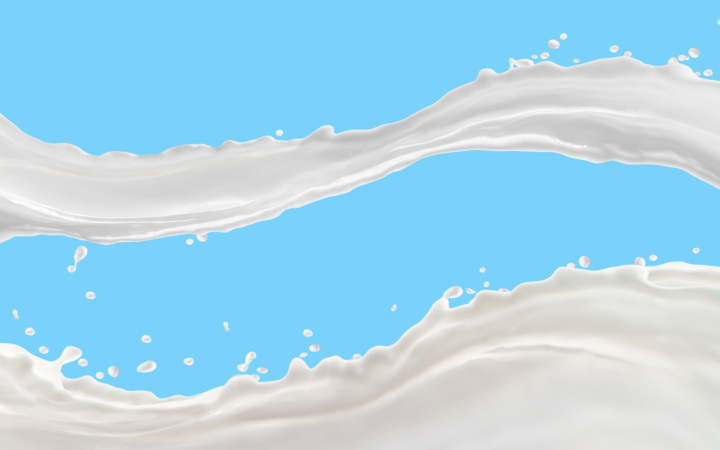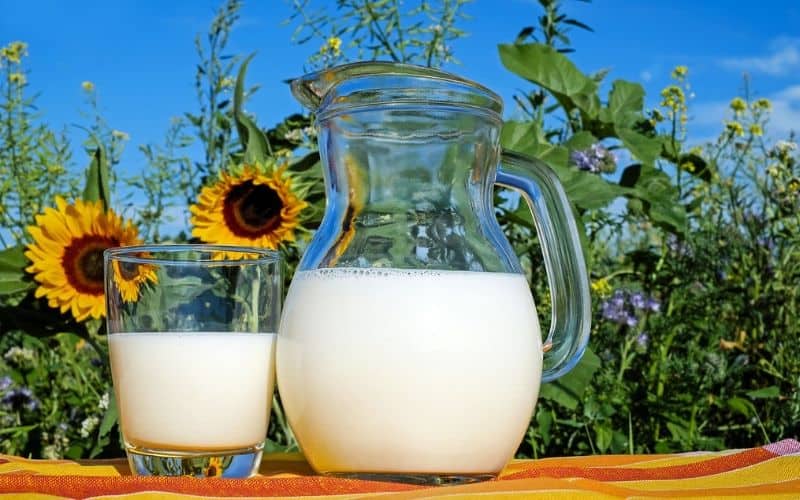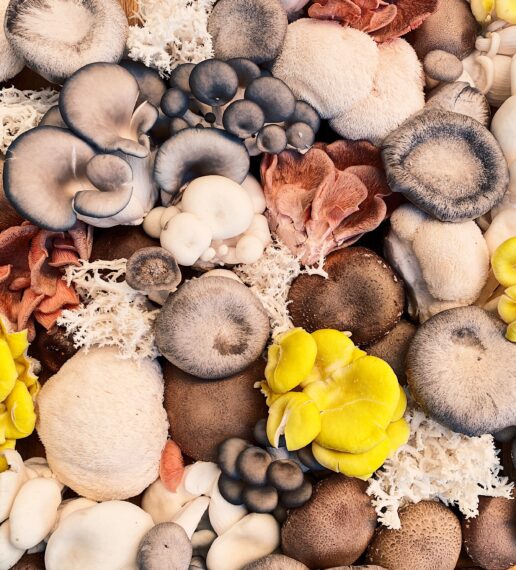Got Milk? We Break Down the 11 Best Dairy-Free Milk Alternatives

Remember your childhood when milk and cookies was a treat you looked forward to all day? Or maybe it was waking up to a bowl of breakfast cereal swimming in cold milk or enjoying a cup of hot cocoa before bedtime? And let’s not forget devouring your favorite ice cream on those warm summer afternoons.
Whatever the memory, milk has some serious nostalgia tied to it. But as you grew up, times changed, and you realized that ingesting cow’s milk is probably something best for … well, cows.
There are many reasons why people opt out of drinking animal-derived milk.
Maybe you’re lactose intolerant. If that’s the case, you’re not alone—approximately 65% of the human population cannot properly digest lactose after infancy. (2) Perhaps you follow a plant-based diet and don’t consume anything that comes from animals.
Or maybe you’re concerned about the hormones in milk, freaked out about the link between dairy and cancer (1), or simply don’t like the taste of cow’s milk.

What Are Milk Alternatives?
Milk alternatives are exactly that—they are milk substitutes for cow’s milk. Of course, there are other animal-derived milks such as goat milk, yak milk, and sheep milk, but in American and Western cultures, it’s almost always milk from cows.
While cow’s milk has significant protein, vitamin D, vitamin A, and calcium, the truth is that dairy products can be high in saturated fat as well as retinol (vitamin A), which at high levels can weaken bones. (3)
Kind of ironic, right?
Instead of reaching for that glass of dairy milk, consider a non-dairy alternative. Just keep in mind that each has a slightly different nutritional profile, so read the labels to make sure you’re getting the vitamins and minerals you need.
Best Milk Alternatives
With so many non-dairy milk alternatives seeming to crop up all the time, it’s important to recognize that not all dairy-free milks are created equal. (4) To help you make sense of it all, we’ve listed some of the most popular options along with some basic facts for each.
While most plant-based milks are easy to make yourself (they also maintain more nutritional value that way), store-bought versions are often fortified to compensate for lack of certain nutrients.
1. Soy Milk
Researchers have determined that nutritionally speaking, soy milk is the best alternative for replacing cow’s milk in the human diet. (5) Soybeans are a complete protein, with each cup boasting 7-8 grams of protein as well as potassium, vitamin A, and vitamin B12.
That said, some people complain about the creamy texture and find it too thick. A more serious concern is that soy is a phytoestrogen (plant-based estrogen), which could have adverse effects although it’s considered safe for most people. (6)
One added bonus of soy milk is that it’s easy to find in any grocery store while others might be a little harder to find.
2. Almond Milk
Although its protein content is shamefully low—it only has a little over one gram of protein per cup—almond milk is a good source of vitamin E, magnesium, and riboflavin.
Made from ground almonds, almond milk also has an appealing, slightly nutty flavor and not-too-thick consistency that many people like.
Almonds are loaded with monounsaturated fatty acids that are linked to weight loss and weight management. (7) Because almond milk is low in certain vitamins and minerals, it’s important to get these nutrients through other sources.
3. Rice Milk
Studies have determined that rice milk is not an ideal alternative for cow’s milk because of limited nutrients, but it’s a great choice if you’re allergic to soybeans and/or almonds. (8) Like almond milk, the amount of protein in a cup of rice milk is abysmally low—less than one gram.
However, most rice milk brands are fortified with calcium and vitamins A and D. Rice milk has a very watery texture and is naturally sweeter than other non-dairy milks.
It’s also high in carbohydrates, so if you have diabetes you’ll want to avoid this one.
4. Coconut Milk
Although coconut milk is another non-dairy option that has been deemed an imperfect alternative for cow’s milk because of its nutritional deficiencies, it’s a good option if you have a soybean or nut allergy. (8)
Coconut milk is high in saturated fat, but it’s become increasingly popular specifically because of its medium-chain triglycerides (MCT), a type of fat that exhibits some anti-inflammatory properties and has been linked to potential weight loss. (9)
However, not everyone is a fan of this high-fat drink and its flavor, which can be too sweet at times.
5. Oat Milk
It’s true that oat milk isn’t as nutritious as whole oats, but one cup of the enriched stuff has about 3 grams of protein as well as vitamin B12, riboflavin, and other nutrients. Oats are also high in beta-glucans—naturally occuring compounds also found in mushrooms—that are linked to a healthy heart and strong immune system. (10)
Studies done as far back as 1999 demonstrated that consuming oat milk lowers cholesterol in adult men. (11) People tend to like oat milk’s mild flavor and slightly creamy texture although some think it can be a bit chalky.
FYI, oat milk is not always gluten-free, so be sure to read the label if this is a concern for you.
6. Hemp Milk
Derived from the tiny hemp seeds, hemp milk is rich in protein, healthy fats, and minerals. Hemp is a complete protein, which means it contains all the essential amino acids that the body cannot make on its own. A cup of hemp milk has almost 5 grams of protein and is naturally gluten-free.
Hemp seeds are also loaded with omega-3 fatty acids and omega-6 fatty acids, which are linked to lowering cholesterol and promoting heart health. (12)
7. Cashew Milk
Made from cashews and water, cashew milk might not be high in protein (only one gram), but it has a number of vitamins, minerals, and antioxidants including lutein and zeaxanthin, which are linked to eye health. (14)
Cashew milk might also control blood sugar levels—a 2010 study found that one of the compounds in cashews had anti-diabetic effects. (15)
Cashew milk is a tasty option for those who like a slightly creamy texture with the subtle sweetness of cashews. Also, it maintains higher fiber content if you make it yourself.
8. Flax Milk
Like hemp milk, flax milk is a seed-based milk. Flaxseeds are a good source of healthy fat, antioxidants, and fiber. (Granted, you won’t get as much fiber in flax milk, but there are other benefits to drinking it.) Flaxseed is noted for its high content of omega-3 fatty acids as well lignans, which are polyphenols packed with antioxidants.
In fact, flaxseed has more than 800 times the amount of lignans than that of other foods. (13) If you like the taste of flaxseeds and a texture that’s not as thick as soy milk, give flax milk a try.
9. Macadamia Milk
Similar to other tree nuts, macadamia nuts can lower the risk for heart disease because they can reduce bad cholesterol levels and promote cardiovascular health. (16)
Although macadamia nut milk has less than one gram of protein per cup, it has significant amounts of tocotrienols, which are part of the vitamin E family that have been linked to fighting cancers. (17)
If you’re looking for a non-dairy milk that has a texture akin to cow’s milk with a mild, slightly sweet flavor that doesn’t overwhelm, then macadamia nut milk is for you.
10. Walnut Milk
It’s not nearly as well-known as almond milk or some of the other dairy-free milks on this list, but walnut milk just might be the one to try.
More than almost any other nut, walnuts are known as the “brain nut” (they actually look like brains, don’t they?) packed with omega-3 fatty acids and phytonutrients that provide powerful antioxidant, anti-inflammatory, antibacterial, and antitumor health benefits. (18)
Because walnuts have a pronounced flavor that can sometimes come off as bitter, you might want to consider one that has been naturally sweetened with vanilla. As for the texture, it’s creamy but not as thick as soy milk.
11. Hazelnut Milk
Also known as filberts, hazelnuts are full of nutrients and healthy fats such as tocopherols (vitamin E) and oleic and linoleic acids, which are necessary for skin health and normal cellular activity. (19)
Even though you might not be too familiar with hazelnut milk yet, but you’ll probably be start seeing more of it.
Along with its high antioxidant levels and other health benefits (20), this tree nut milk has a distinctive nutty flavor and creaminess that works great in coffee and other drinks that need a little boost in taste.

What To Avoid In Milk Alternatives
While there are numerous health benefits to drinking non-dairy milks, there are some ingredients to watch out for and avoid when possible.
- Carrageenan: This thickening agent gives non-dairy products a creamy texture, but it’s been linked to inflammation, cancer, and diabetes. (21)
- Added sugars and salt: These are often added for flavor, not nutritional value, so be mindful if you are monitoring your glucose and sodium intake.
- Gellan gum: This vegan food additive is considered safe for binding, stabilizing, and adding texture to non-dairy products, but it can cause digestive issues and affect gut microbiota in high doses. (22)
- Other thickeners or additives: While most store-bought milk alternatives add extra ingredients, look for brands that minimize this.
Milking It
Although dairy milk can provide protein, vitamin D, and calcium, the bottom line is that you can have a perfectly healthy diet without it—as long as you’re getting those nutrients from other food sources.
With so many non-dairy milk alternatives to choose from these days, there’s no reason you can’t relive your childhood and still enjoy a glass of milk and cookies.

